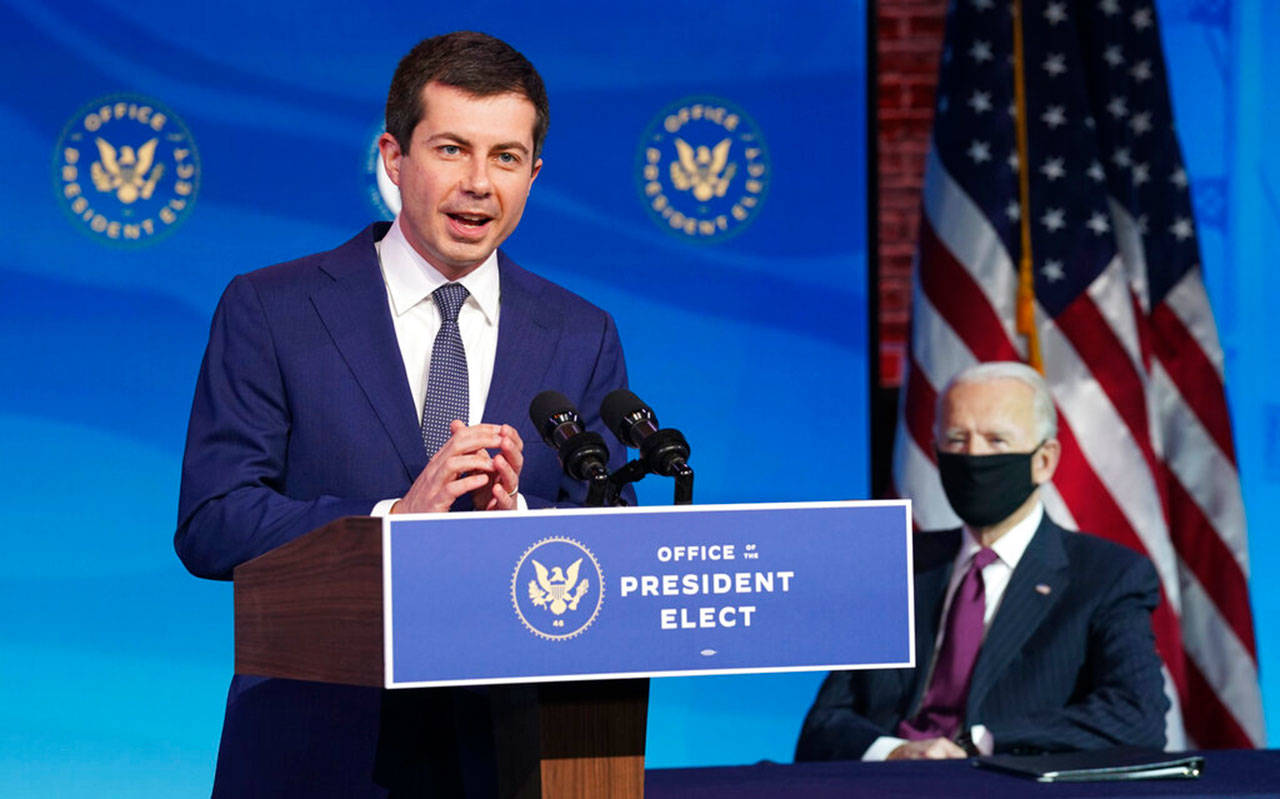By Noah Smith / Bloomberg Opinion
Former mayor and one-time presidential candidate Pete Buttigieg has been tapped to be President-elect Biden’s transportation secretary.
He’ll bring a much-needed dose of managerial competence to an oft-neglected area of government policymaking. By focusing on identifying and remedying sources of excess cost in our infrastructure system, and by helping speed the transition to electric vehicles, he can have a major impact even in an era of political deadlock.
The biggest transportation issue on everyone’s mind is infrastructure. Not only are U.S. roads and bridges perpetually falling apart, but big construction spending is needed as a stimulus to boost the country out of its post-pandemic doldrums. Buttigieg, during his primary presidential run, was one of a number of Democratic candidates to propose a construction spending bonanza.
Unfortunately, this is how the U.S. does infrastructure. We delay repairing it, arguing over how much to spend and who foots the bill, until there’s an economic crisis. Then, as in the 2009 stimulus bill, we splurge on road repair and patch things up for another decade. Depending on how much cooperation they get in Congress, Biden and Buttigieg might be able to pull off this trick again.
But a larger issue looms behind the scenes: how much it all costs. The reason America spends only reluctantly and fitfully on infrastructure goes beyond mere partisan bickering. The U.S. is unusual among advanced nations in having ruinously high construction costs for roads and public transit. By some measures, productivity in the industry is actually falling.
There are many different theories explaining why the price for construction has risen so dramatically, including land-use policies that allow landowners to block construction, and inefficiency and corruption in the contracting process. In actuality, it’s probably a combination of factors, encouraged by decades of complacency. Because no one can identify a specific cause, it’s not the kind of thing that the president can wave his hands and fix, even with the help of Congress.
That’s where Buttigieg comes in. He spent several years working as a McKinsey & Co. consultant. During that time, he consulted for various federal government agencies. Now, you may have a problem with McKinsey’s ethics, but you have to admit they know their stuff when it comes to cost-cutting. Buttigieg is therefore uniquely qualified to get to the bottom of U.S. infrastructure costs.
The key would be to assemble a panel of experts, tasked with identifying, quantifying and proposing solutions to the various cost problems in the U.S. system over the next four years. This is a long-term effort, and probably wouldn’t pay off during Biden’s first term in office. But if successful, a McKinsey-like cost-cutting push would make it easier for both states and the federal government to spend on fixing roads and building new trains in the future, because they’d be getting much more bang for the buck. And that in turn would help the U.S. go from a transit laughingstock back to a respectable advanced country.
A second big thing Transportation Secretary Buttigieg can do, even without Congress, is to help speed the U.S. toward its zero-carbon future. One important piece of the energy transition lies firmly within the purview of the Department of Transportation: the shift to electric vehicles.
EVs are finally becoming competitive with internal combustion engines in terms of both cost and range. That alone will increase adoption, but things will go much faster if the government acts to boost the number of charging stations. There’s a chicken-and-egg problem here: the more places there are available for charging, the easier it is to drive your electric car around, and the more electric cars are being driven around, the more profitable it is to run a charging station.
So instead of waiting for the free market to build this network up slowly, the government needs to act to speed the process along. Also, the government can set standards to make sure all electric-vehicle companies use compatible chargers, just as gas pumps work with any make and model.
Biden understands this, and pledged to build 500,000 new public charging outlets by 2030. That’s actually a non-trivial task, since it involves deciding where to build first, working with states and private companies, keeping abreast of the latest technology and building new electrical lines to the charging stations. With his experience consulting for the Energy Department, the Environmental Protection Agency and the U.S. Postal Service while at McKinsey, Buttigieg has the chops to tackle this complex task.
So Buttigieg will have plenty of chances to leverage his consulting skills in the service of upgrading U.S. infrastructure. Beyond just lobbing a big pot of money at the problem, bringing down infrastructure costs and transitioning to electric vehicles will require smarts and a hardheaded, problem-solving approach.
Noah Smith is a Bloomberg Opinion columnist. He was an assistant professor of finance at Stony Brook University, and he blogs at Noahpinion.
Talk to us
> Give us your news tips.
> Send us a letter to the editor.
> More Herald contact information.

























